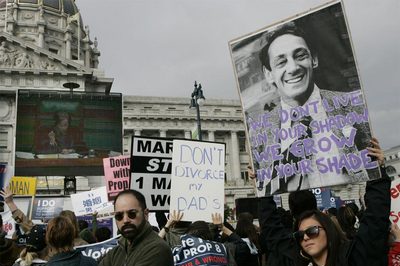In a much-anticipated hearing last week, the California Supreme Court heard from opponents and advocates of Proposition 8, which banned same-sex marriage in the state, and will release its ruling on the constitutionality of the measure in the next few months.
The seven-member court listened to arguments March 5 for more than three hours and, while support for the overturning of the ban was tepid, the justices did express firmer backing for the validity of the same-sex marriages that took place during the time that such unions were legal in the state.
California voters approved Prop. 8 in the November election by a 52-48 percent margin, adding to the state’s constitution the wording that “only marriage between a man and a woman is valid or recognized in California.”
In a 4-3 decision in May 2008, the court had ruled that marriage was an inherent right that could not be denied to same-sex couples, but the voters overturned that ruling.
More than 18,000 same-sex couples married between June and November.
“When the highest court of the state declares that same-sex couples have the right to marry, how can one deny the validity of those marriages?” said Justice Marvin Baxter, one of the justices who voted against the majority in last year’s Supreme Court ruling.
The primary issue during last week’s hearing was not the constitutionality of same-sex marriage but rather the process by which such unions were banned in the state.
Shortly after the Nov. 4 election, two groups of same-sex couples and a group of local governments, led by San Francisco, filed legal challenges. Attorneys for the groups argued during last week’s proceeding that Prop. 8 should have been considered a revision, a major change to the constitution that would require the backing of two-thirds of both houses of the state legislature before being put to a public vote, rather than an amendment, which is posed directly to voters, as was Prop. 8.
Chief Justice Ronald George, who voted in favor of legalizing same-sex marriage last year, noted courts have previously upheld “initiatives that have taken away rights from minorities by majority vote,” such as a ban on affirmative action initiated by the voters.
“Isn’t that the system we have to live with? Is it for the court to limit the people’s power to amend the Constitution?” George asked.
Jennifer Pfizer, marriage project director for Lambda Legal and a co-counsel in the legal challenge to Prop. 8, said the public should not have the final say in an issue as far-reaching as same-sex marriage.
“Proposition 8 is no ‘garden-variety’ amendment that changes a tax or zoning or safety rule in a way that affects everyone equally,” Pfizer said. “This is a radical attempt to strip a cherished constitutional right from just one targeted minority group and then to stop the courts from doing their most basic job of upholding the constitutional promise of ‘liberty and justice for all.’”
Christopher Krueger, a senior assistant in Attorney General Jerry Brown’s office, argued for Brown that last year’s Supreme Court decision put forth the idea that marriage was an “inalienable right,” although the justices questioned the validity of his argument.
Justice Joyce Kennard, who supported the same-sex marriage ruling last year, noted that the state’s voters also have the “inalienable right to amend the constitution.”
“You ask us to willy-nilly disregard the right of the people to change the constitution of the state of California,” Kennard said. “But all political power is inherent in the people of California.”
When the justices questioned Kenneth Starr, who argued on behalf of Protect Marriage in favor of upholding Prop. 8, he acknowledged that he believes the constitution gives the public the power to repeal any constitutional right, such as the right to free speech, as long as such an issue gains a simple majority vote.
“While it is unthinkable, the people do have the raw power” to do so, Starr noted.
Shannon Minter, legal director of the National Center for Lesbian Rights who also presented arguments during the hearing, said the upholding of Prop. 8 could set a dangerous precedent for the state.
“Our constitution is based on the principle that majorities must respect minority rights,” she said. “But if a majority can change the constitution to take away a fundamental right from one group, then it can take away fundamental rights from any group. Our government will have changed from one that respects minority rights to one in which the power of the majority is unlimited.”
The night before the arguments, LGBT and ally individuals gathered for rallies and vigils across the state, with a San Francisco event drawing such guests as actor Hal Sparks, “Milk” screenwriter Dustin Lance Black, LGBT activist Cleve Jones and plaintiffs in the case Robin Tyler and Diane Olson and the Rev. Troy Perry, founder of the Metropolitan Community Church.
Hundreds of marriage-equality supporters, as well as some protesters, demonstrated outside San Francisco City Hall, where the Supreme Court hearing was underway, as the proceeding played across a large television screen in front of the building.
The court has up to 90 days to issue its ruling.
Jen Colletta can be reached at [email protected].
